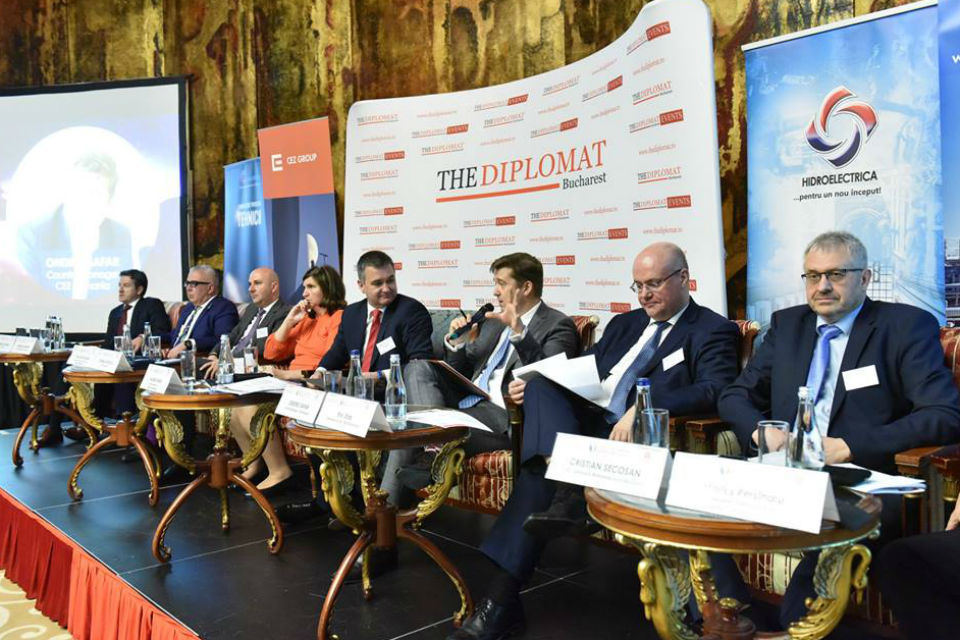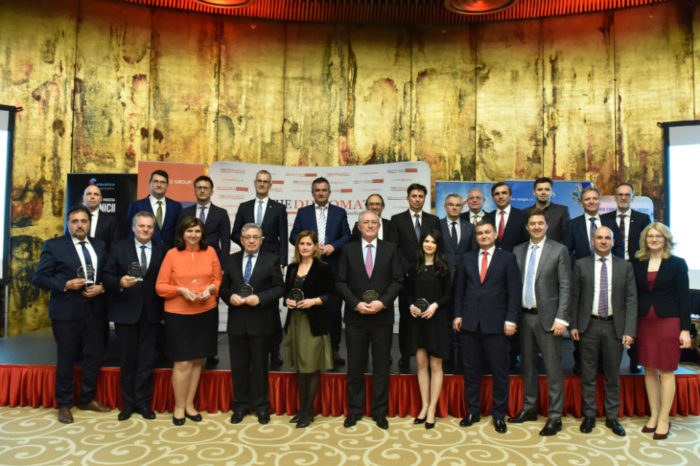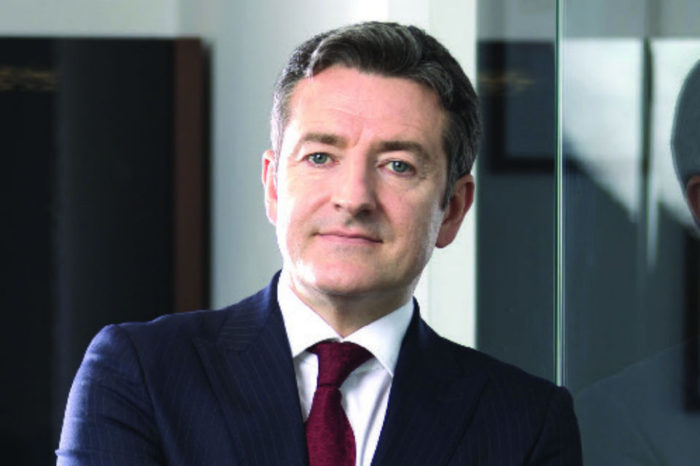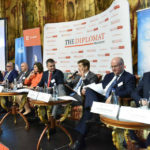Energy CEOs in Romania share their insights: from energy independency to prosumer revolution and energy cloud

The Diplomat-Bucharest has organized the eight edition of its CEO forum aimed at Romanian energy firms. With more than 125 confirmed participants and 30 CEOs in the room, we have brought together once again some of the most important figures from Romania’s business and civil society and the energy sector community and top level to discuss in a special CEO forum session some of the most pressing issues the industry faces today.
In his opening speech, Valeriu Binig, Senior Advisor at EY Romania and session moderator, has invited the CEOs to discuss more about the future, about their plans, and challenges for the industry.
“Now, the energy sector is dominated by Ds: decentralization, decarbonation, digitalization, disruptive behavior, diversification,” he said. “The newest word I heard is depopulation which indicates that we are losing specialists. We hear some people saying technology will replace everybody who is leaving, while others say human knowledge cannot be immediately replaced by artificial intelligence, robot process automation,” Binig added.
Eric Stab, chairman & CEO at Engie Romania, said “D” is his favorite letter in the alphabet and he really appreciated the interesting introduction made by Valeriu Binig.
“This is indeed what many are trying to achieve in the companies: decentralization, digitalization and so on. We are trying to achieve the transition towards a zero carbon economy as a service,” said Stab. “What does it mean? It means focusing more on decarbonizing our economy. It is interesting to speak to customers and see what are their expectations. They also want to contribute to a better environment and to fight climate change. We want to be 100 percent carbon neutral everywhere, including Romania. There is always potential for energy efficiency,” he added.
Where the energy sector is going to be in the next five years? Ondrej Safar, Country Manager of CEZ Romania shared his opinion: “Before I came to Romania I was working in Turkey and the approach there is very different to what happens here in Europe. The strategy is to be energy independent and this the number one priority. I would say the main priority for the next five years is energy independency. Many of the strategies of the European countries are about energy independency. When it comes to Europe it all goes around decentralization and decarbonization. This is something which is driving us forward.”
In the next five years Romania will face many challenges and will have to make some important decisions, according to Adrian Volintiru, CEO & board member of Romgaz: “The supply sources will be very different, but I want to underline the quality of the Romanian methane gas, which is very high. This means 99.99 percent methane which is very good for Romania. It’s important for Romania to protect its resources in the next years. From my point of view, the gas from Black Sea should be a protected resource, and it may be a better option for Romania to import more gas in the next 5-6 years.”
Corneliu Bodea, CEO Adrem, argued that future belongs to electricity and decarbonization will be the main task. “We are going to use more and more renewables, that is for sure. I agree that gas is a transition resource because our system is not prepared to receive a higher percent of renewables right now. This is actually telling us where to look and where to invest. We have to invest in smart grids, into increasing the level of control of the grids in order to reach that point were we can rely more on renewables. I agree that gas is playing a very important role and will probably continue to do for the next 10-15 years.”
Corina Popescu, CEO Electrica, had an interesting approach by saying that prosumers will start a revolution in the energy market. “I really believe that prosumers will be the trigger to increase the supply activity from a supply of commodity to a supply of services. We need to change our mindset for the future. I think it’s not necessary to invest only in distribution networks. We need to think a step head. We need to invest in innovation solutions because this could help our system,” she said.
Bogdan Badea, president of board of directors at Hidroelectrica, argued that there is a problem with energy policies between European Union and other competitors such as China or United States.
“This is one important aspect when we speak about decarbonization,” he said. “If we go to extreme, we have to see what does it a mean a 100 percent decarbonization. It is possible now in Romania or in Europe? This is a very important topic. Can we imagine Europe, let’s say in the next 5-10 years, without nuclear power plants, without coal powered plants? Realistically speaking, we cannot see Europe without nuclear and coal, this is a reality,” Badea added.
Cristian Secosan, CEO Siemens Romania and Moldova, said that his company is focusing on three directions: electrification, automation and digitalization. “This is actually the right order because without electricity we cannot have anything. One cannot automate, cannot digitalize without electricity,” he explained. Secosan also said that C is a very important letter for Siemens, because it stands for customers: “Customer means everything, from market to global trends. This is our task, to find solutions for our customers. We have to provide solutions and this is what drives us.”
Energy trends are all coming from the customers, according to Marius Persinaru, Country President Romania & Republica Moldova at Schneider Electric. “Decentralization, decarbonization or digitalization are not coming because we like it, because people like the sound of it,” he said. “Sooner or later, it comes from practical needs. I have started my career in the energy sector, then I moved into IT, and now I came back to energy. It is interesting because I see now concepts from IT coming into to the energy market. I would only mention two of them: energy cloud and energy as a service.”














